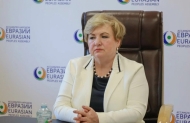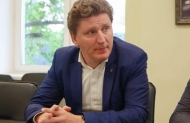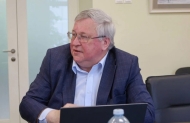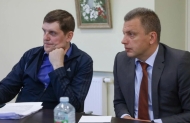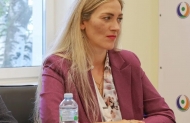
Photo: Eurasian Peoples' Assembly
On May 5, in Moscow, representatives of the regions and experts, discussed the role of IT technologies in the formation of a single information and communication space in Eurasia. The discussion was organized within the dialogue platform "Meetings on Uspensky" - a joint project of the Eurasian Peoples' Assembly and the "Regions of Russia" Holding.
The meeting was moderated by the First Deputy Secretary General - Head of the General Secretariat of the Eurasian Peoples' Assembly Svetlana Smirnova and General Director of the Holding "Regions of Russia" Olga Chernokoz. In her opening speech, the Deputy Secretary General of the Eurasian Peoples' Assembly Svetlana Smirnova conved greetings of the Secretary General of the Assembly Andrey Belyaninov and detailed the tasks of developing cooperation between the Eurasian countries. She stressed the importance of information technologies, which erase all borders and distance and promote the most effective interaction and dialogue. Olga Chernokoz, in her turn, thanked the Assembly for desire to unite representatives of the regions, business, media on its platform, using their resources and capabilities to solve the strategic tasks facing the country.
The director of the Center for Political Analysis and Information Security Svyatoslav Andrianov delivered a keynote speech. He spoke about the historical process of promoting the point of view of the West and the "soft power" of the United States within the framework of European and Russian culture and education. This became possible thanks to a wide program of grants and training of students on preferential terms with very attractive educational programs, saturated with information of a certain direction. The expert noted that Russia did not carry out similar work. And now our country needs to cultivate its own system of values, which can be opposed to the Western project, the expert believes. In addition to conservative values, it is necessary to create an alternative that is attractive to the perception of young people.
Continuing the discussion on the possibilities of promoting the national interests of Russia in the near and far abroad, Yuri Krupnov, Chairman of the Supervisory Board of the Institute for Demography, Migration and Regional Development, drew the attention of the audience to the need to create new narratives and examples of achievements and successes in the post-Soviet space. The expert shared his opinion that at present there is a clear lack of innovation in the country, we export few goods and services that are attractive to the whole world. “Successes in space and the attractiveness of the Soviet project are already in the past, new products, ideas and solutions are needed,” the speaker is convinced.
“The idea of Greater Eurasia should be made up of what Russia can give to the world. On the example of China, we see how successfully it is possible to promote the necessary directions for the development of the country and society through the media and popular culture. Despite all the problems, Beijing has the will and desire to develop and break through to international leadership,” Yury Krupnov compared.
During the meeting, experts discussed digital tools for their own Greater Eurasia agenda, which could include countries such as China, India, and Iran. At the same time, Russia continues to promote flexible integration within the Eurasian partnership. For example, the membership can include not only states, but also already existing associations and organizations (EAEU, ASEAN, SCO, APEC, etc.).
President of the Eurasian Business Association (EAB) Maxim Chistyakov commented on the situation with business interaction in Greater Eurasia. He noted a sharp change in the areas of work and the lack of the necessary foundation for the rapid establishment of the necessary links. He emphasized the importance of the initiative to create a digital platform for doing business in the Eurasian space.
“Now many ties are broken and we have to look for ways to diversify the market. There is interaction with those partners and countries that were not so active before. The main commodity flows were to Europe, now they are deployed to the South and Asia. We must develop humanitarian cooperation with them,” the EAB President explained.
Experts and invited participants from regional offices gave their assessment of Russia's readiness to extend its technological sovereignty to neighboring countries.
For example, Anna Shemyakina, a blogger and expert on Russian abroad, noted that today there is a problem of uniting compatriots. “We cannot call others to our idea, since we cannot even unite our compatriots,” the expert said.
The participants discussed one of the ways how to build a single humanitarian space with the help of modern information technologies - the project of the Eurasian information platform, which will include a marketplace for folk art goods, farm products, a showcase of cultural values and a communication platform for the peoples of Eurasia. The project was presented by Igor Vedenyapin, managing Partner, Technical Director of IVENA. According to him, thanks to this platform, every citizen in Eurasia will be able to popularize their culture and its features, share its benefits. And small enterprises with national and regional specifics at the farmer level will have the opportunity to present their product. It will also be possible to establish a cultural and tourist exchange through the available base of museums, attractions and tours. People will be able to create communication communities in their preferred languages. This will bring people of different cultural and religious values together.
“In order to unite a large number of people, the population of several countries, a communication platform is needed. And not just one, but a whole complex. The modern world is developing by communities from small ones in the past to large ones in the present, connected by common goals and interests ... One of the tasks of the Eurasian Peoples' Assembly is public diplomacy. Here, on this platform, the processes will be initiated by people, not by the leadership. Thus, we are able to unite more than 4 billion people with communication links and give everyone the opportunity to imagine themselves in this space,” said Igor Vedenyapin.
During the meeting, Evgeny Safronov, editor-in-chief of the InterMedia news agency, spoke about the role of information technology in the development of culture and society. He drew attention to the Russia’s potential and the opportunities that our country still has, despite the existing difficulties. Technologies make it possible to distribute and receive works of art that convey the necessary communication units. But so far, unfortunately, we do not approach IT as a cultural phenomenon, he stressed.
“Information and communication technologies are the main conductors of culture. And culture is the basis of civilization. All ideology is built on culture. Our country has something to offer in this context. Russia is one of the few countries that has its own search engine. We have our own social networks and streaming. This is not all, but it is at least something,” said Yevgeny Safronov.
In his speech, the expert presented the research work results of the domestic cultural sector, noted the existing shortcomings in its management.
Alexander Rossikhin, Development Director of LLC "Initiative" also made a presentation. The expert expressed his conviction that in 20-30 years all the tasks that people solve in society today could well be implemented by artificial intelligence algorithms.
“What will be left for the man? Only sincerity, emotions, the ability to feel happy and the desire to share this feeling with other people,” the speaker emphasized, focusing on the need to humanize the IT sector, its development with a focus on fundamental human values and goals.
As a result of the meeting, it was noted that the speakers presented a number of ideas and comments necessary for the development of IT in business, culture and education in the space of Greater Eurasia. As summarized at the end of the meeting by Olga Chernokoz, General Director of the holding "Regions of Russia", "Meetings on Uspensky" project attracts more and more participants and representatives from the regions, which indicates the demand for this open discussion format and the relevance of the topics covered.
The First Deputy Secretary General of the Eurasian Peoples’ Assembly Svetlana Smirnova thanked all participants for the reports and proposals made during the meeting, called for continued systematic interaction with the Assembly as a platform for promoting integration projects in this area.
The meeting was attended by Olga Shtanakova, First Deputy Plenipotentiary Representative of the Republic of Altai in Moscow, Nailya Aslanova, Head of the Representative Office of the Arkhangelsk Region under the Government of Russia, Evgeny Vlasov, Head of the Representative Office of the Kamchatka Territory, Fatima Romanova, First Deputy Official Representative of the Republic of Adygea, Deputy Head of the Department of National, Youth Policy and interregional relations of the Republic of Ingushetia Shamil Dzeytov and other representatives of the subjects of the Federation.
The material was prepared by the media holding "Regions of Russia"



